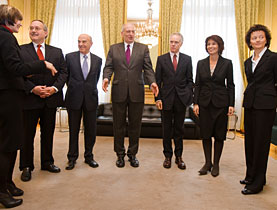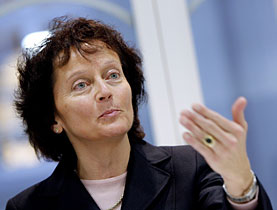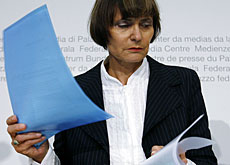Widmer-Schlumpf inherits justice ministry

Newly elected cabinet member Eveline Widmer-Schlumpf will take over the justice ministry from her ousted colleague Christoph Blocher in January.
Widmer-Schlumpf, also from the rightwing Swiss People’s Party, was widely tipped to take over the department after none of the other cabinet ministers expressed a desire to change places.
Blocher failed to be re-elected by parliament last week for another four-year term.
Traditionally, when there is a vacancy incumbents can switch ministries based on seniority. New arrivals must take what is left.
Widmer-Schlumpf said after accepting her election last week that she did not have any preferences. Blocher had been the only minister who had openly expressed his desire to change portfolio in the future.
Moritz Leuenberger from the centre-left Social Democratic Party remains at the transport, communication and energy ministry; his party colleague Micheline Calmy-Rey will continue as foreign minister; Pascal Couchepin and Hans-Rudolf Merz from the centre-right Radical Party will remain at the interior and finance ministries respectively.
Doris Leuthard from the centre-right Christian Democratic Party will stick with the economy and the other representative of the People’s Party, Samuel Schmid, will pursue reforms at the defence ministry. Discussions were over in just five minutes.
Third woman
Widmer-Schlumpf is the third woman to take over the justice ministry after the Radical Elisabeth Kopp, who was forced to leave her position, and the Christian Democrat Ruth Metzler, who was beaten by Blocher in the parliament election four years ago.
While she headed up the finance department in canton Graubünden, she should not have too much trouble adapting to the justice ministry, as she is a qualified lawyer.
One of the main challenges the new minister faces is the issue of the oversight of the Federal Prosecutor’s Office. Today that oversight is shared between the ministry and the Federal Criminal Court, but the government would like to take it over.
The issue came to a head not long before the October general elections after Blocher was accused of forcing former federal prosecutor Valentin Roschacher out of his job and not following procedures. Cabinet however cleared the justice minister of any abuse of power.
Widmer-Schlumpf will also have to tackle the question of whether to drop restrictions on property purchases by foreigners. While the government is in favour, some political parties and local authorities have questioned the wisdom of opening the market.
Collision course?
The new minister might also be on a collision course with her own party if the Swiss have to vote on an initiative calling for the expulsion of foreign criminals. This might happen more than once if an initiative calling for local communities to vote on naturalisations goes ahead.
Widmer-Schlumpf will probably have to consider as well some issues put on the backburner by her predecessor. Among them assisted suicide and the surveillance of organisations that propose it, even if she has admitted being reticent to legislate.
It may prove hard though to set a roadmap for the next four years for the time being. Cabinet has been considering a redistribution of its tasks.
The interior and the economics ministries were mandated to examine options to bring higher education and research under one roof.
The defence, police and finance ministries were asked to consider ways of merging the armed forces, the federal police and border guard units into a security ministry.
A final decision is widely expected in February.
swissinfo with agencies

More
Government, ministers, president
Christoph Blocher was only the fourth cabinet minister in Swiss history to fail to win re-election.
Usually it’s up to a cabinet minister to choose the moment to step down. Ministers are elected for a four-year term by parliament.
Eveline Widmer-Schlumpf is the third woman in the cabinet, joining Foreign Minister Micheline Calmy-Rey and Economics Minister Doris Leuthard.
Blocher attended parliament for the last time as justice minister on Tuesday, promising to be politically active and claiming that he was not bitter about his eviction.

In compliance with the JTI standards
More: SWI swissinfo.ch certified by the Journalism Trust Initiative



You can find an overview of ongoing debates with our journalists here. Please join us!
If you want to start a conversation about a topic raised in this article or want to report factual errors, email us at english@swissinfo.ch.